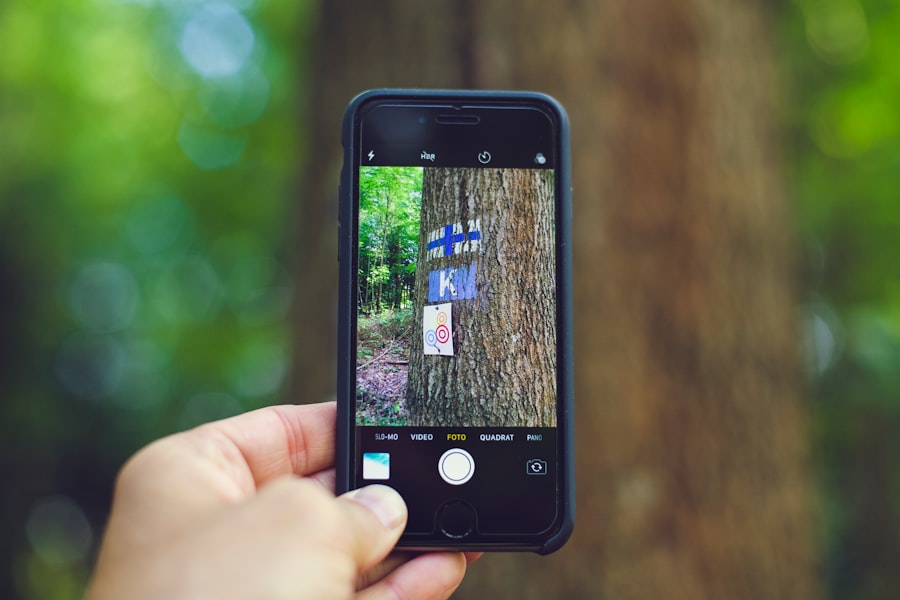In today’s fast-paced digital world, phone addiction has become a prevalent issue that affects individuals across all age groups. You may find yourself reaching for your smartphone at every opportunity, whether it’s during a break at work, while waiting in line, or even in the middle of a conversation. This compulsive behavior often stems from the constant availability of information and social interaction that smartphones provide.
The allure of notifications, social media updates, and instant messaging can create a cycle of dependency that is difficult to break. Understanding the nature of phone addiction is the first step toward regaining control over your life. Phone addiction is not merely a matter of excessive use; it can be characterized by an overwhelming urge to check your device, even when it interferes with daily activities or responsibilities.
You might notice that your phone has become an extension of yourself, a tool that you rely on for validation, entertainment, and connection. This dependency can lead to a distorted sense of reality, where the digital world feels more engaging than the physical one. Recognizing these patterns in your behavior is crucial for addressing the issue and finding healthier ways to engage with technology.
Key Takeaways
- Phone addiction is a real issue that can have negative impacts on mental and physical health.
- Phone addiction can lead to increased anxiety, depression, and feelings of isolation.
- Physical health risks associated with phone addiction include poor posture, eye strain, and disrupted sleep patterns.
- Phone addiction can lead to social consequences such as decreased face-to-face interactions and difficulty maintaining relationships.
- Overcoming phone addiction requires setting boundaries, creating healthy habits, and seeking professional help if needed.
The Impact of Phone Addiction on Mental Health
The mental health implications of phone addiction are profound and far-reaching. You may experience heightened levels of anxiety and stress as you constantly check for updates or notifications. The fear of missing out (FOMO) can drive you to stay glued to your screen, leading to feelings of inadequacy when you compare your life to the curated images and posts of others.
This cycle can create a negative feedback loop, where your mental well-being deteriorates as your phone use increases. Moreover, excessive phone use can contribute to feelings of loneliness and isolation. While social media platforms are designed to connect you with others, they can often have the opposite effect.
You might find yourself scrolling through feeds filled with friends’ highlights while feeling disconnected from your own reality. This dissonance can exacerbate feelings of depression and anxiety, making it essential to address your relationship with your phone before it takes a more significant toll on your mental health.
Physical Health Risks Associated with Phone Addiction

Phone addiction doesn’t just affect your mental well-being; it can also pose serious physical health risks. You may find yourself spending hours hunched over your device, leading to poor posture and musculoskeletal issues. This sedentary lifestyle can contribute to a range of health problems, including obesity, cardiovascular disease, and chronic pain.
The longer you remain engrossed in your phone, the more likely you are to neglect physical activity and healthy habits. Additionally, excessive screen time can disrupt your sleep patterns. You might be tempted to scroll through social media late into the night, exposing yourself to blue light that interferes with melatonin production.
This disruption can lead to insomnia and fatigue, further compounding the negative effects on both your physical and mental health. Recognizing these risks is vital for making informed choices about your phone usage and prioritizing your overall well-being.
The Social Consequences of Phone Addiction
| Impact | Statistics |
|---|---|
| Decreased Productivity | 60% of people admit to using their phones at work |
| Relationship Strain | 40% of people feel ignored by their partner due to phone use |
| Mental Health Issues | 50% of young adults report feeling addicted to their phones |
| Social Isolation | 30% of people feel disconnected from friends and family due to phone use |
The social consequences of phone addiction are often overlooked but can be just as damaging as its mental and physical effects. You may find that your relationships suffer as you prioritize screen time over face-to-face interactions. Friends and family might express frustration when they see you more engaged with your phone than with them during gatherings or conversations.
This disconnect can lead to misunderstandings and feelings of neglect among loved ones. Moreover, the constant distraction of notifications can hinder your ability to engage meaningfully with others. You might miss out on important moments or fail to fully participate in conversations because you’re preoccupied with your device.
This behavior not only affects your relationships but can also create a sense of social anxiety when you feel compelled to check your phone even in social settings. Acknowledging these social consequences is essential for fostering healthier connections with those around you.
Productivity and Phone Addiction
Phone addiction can significantly impact your productivity levels, making it challenging to focus on tasks at hand. You may find yourself frequently distracted by notifications or the urge to check social media, leading to decreased efficiency in both personal and professional settings. This constant interruption can result in missed deadlines and unfinished projects, creating a cycle of stress and frustration.
Furthermore, the addictive nature of smartphones can lead to procrastination. Instead of tackling important tasks, you might find yourself mindlessly scrolling through apps or watching videos.
Recognizing the detrimental effects of phone addiction on your productivity is crucial for implementing strategies that help you regain focus and achieve your goals.
The Role of Dopamine in Phone Addiction

Dopamine plays a significant role in the development and maintenance of phone addiction. This neurotransmitter is often referred to as the “feel-good” chemical because it is released during pleasurable activities, including using your smartphone. Each time you receive a notification or engage with content that you enjoy, your brain releases dopamine, reinforcing the behavior and creating a desire for more instant gratification.
You may find yourself caught in a cycle where the anticipation of receiving notifications becomes just as rewarding as the notifications themselves. This cycle can lead to compulsive checking behaviors, where you feel an overwhelming urge to reach for your phone even when there are no new updates. Understanding the role of dopamine in this process can help you recognize why breaking free from phone addiction is so challenging and why it requires intentional effort to rewire your brain’s reward system.
Signs and Symptoms of Phone Addiction
Recognizing the signs and symptoms of phone addiction is essential for addressing the issue effectively. You may notice that you spend an excessive amount of time on your device, often losing track of hours as you scroll through social media or play games. This compulsive behavior may lead to neglecting responsibilities or missing out on important events in your life.
Additionally, you might experience withdrawal symptoms when you’re unable to access your phone. Feelings of irritability, anxiety, or restlessness can arise when you’re separated from your device for an extended period. These signs indicate that your relationship with technology has become unhealthy and that it’s time to take action toward regaining control over your phone use.
Strategies for Overcoming Phone Addiction
Overcoming phone addiction requires a multifaceted approach that involves self-awareness and intentionality. One effective strategy is setting specific limits on your phone usage. You might consider using apps that track screen time or set daily limits for certain applications.
By establishing boundaries around how much time you spend on your device, you can begin to reclaim those hours for more meaningful activities. Another helpful strategy is to create designated phone-free zones or times throughout your day. For instance, you could establish a rule that prohibits phone use during meals or before bedtime.
This practice not only encourages healthier habits but also allows you to engage more fully with the people around you or enjoy moments of solitude without distractions.
Setting Boundaries with Technology
Setting boundaries with technology is crucial for managing phone addiction effectively. You may want to start by evaluating which apps or activities consume most of your time and energy. Once you’ve identified these areas, consider removing unnecessary apps or disabling notifications that draw you back into mindless scrolling.
Additionally, establishing tech-free times during the day can help create a healthier balance between digital engagement and real-life interactions. For example, designating specific hours in the evening as “phone-free” can encourage quality time with family or friends without the constant distraction of devices.
Creating Healthy Habits Around Phone Use
Creating healthy habits around phone use involves being intentional about how and when you engage with technology. You might start by replacing mindless scrolling with more productive activities that align with your interests or goals. For instance, consider using some of that time for reading, exercising, or pursuing hobbies that bring you joy.
Additionally, practicing mindfulness when using your phone can help foster a healthier relationship with technology. Before reaching for your device, take a moment to ask yourself why you’re doing so—are you seeking information, connection, or simply filling time? By cultivating awareness around your motivations for using your phone, you can make more conscious choices about how you engage with technology.
Seeking Professional Help for Phone Addiction
If you’ve tried various strategies but still find it challenging to manage your phone addiction effectively, seeking professional help may be beneficial. Therapists and counselors specializing in behavioral addictions can provide valuable insights and support tailored to your unique situation. They can help you explore underlying issues contributing to your dependency on technology and guide you toward healthier coping mechanisms.
Additionally, support groups focused on technology addiction can offer a sense of community and shared experiences among individuals facing similar challenges. Engaging with others who understand what you’re going through can provide motivation and encouragement as you work toward overcoming phone addiction together. Remember that seeking help is a sign of strength and an essential step toward reclaiming control over your life and well-being.
In conclusion, understanding phone addiction is crucial for recognizing its impact on various aspects of life—from mental health to productivity and social relationships. By acknowledging the signs and symptoms associated with this dependency, you empower yourself to take proactive steps toward overcoming it. Implementing strategies such as setting boundaries with technology and creating healthy habits around phone use can significantly improve your relationship with devices.
If necessary, don’t hesitate to seek professional help; taking action today will pave the way for a healthier tomorrow.
In today’s digital age, phone addiction has become a growing concern, with many individuals finding it challenging to disconnect from their devices. A recent documentary sheds light on this pervasive issue, exploring the psychological and social impacts of excessive phone use. For those interested in delving deeper into the topic, a related article on the subject can be found on Unplugged Psych, which offers insights into the psychological aspects of phone addiction and strategies for managing screen time. You can read more about it by visiting this link.
LEARN WHY Your Brain Isn’t Addicted to Likes; the Algorithm Gaslights You Daily, Hard.
FAQs
What is phone addiction?
Phone addiction, also known as nomophobia, is the excessive and compulsive use of smartphones or mobile devices, leading to negative effects on one’s physical and mental well-being.
What are the signs of phone addiction?
Signs of phone addiction may include constantly checking the phone, feeling anxious when the phone is not accessible, neglecting responsibilities due to phone use, and experiencing physical discomfort when not using the phone.
How does phone addiction affect mental health?
Phone addiction can lead to increased anxiety, depression, and stress. It can also negatively impact sleep patterns, attention span, and overall well-being.
What are the effects of phone addiction on physical health?
Excessive phone use can lead to issues such as eye strain, neck and back pain, and disrupted sleep patterns. It can also contribute to a sedentary lifestyle and decreased physical activity.
How can phone addiction be managed?
Managing phone addiction involves setting boundaries for phone use, practicing mindfulness and self-control, seeking support from friends and family, and seeking professional help if necessary.
What are the long-term consequences of phone addiction?
Long-term consequences of phone addiction may include social isolation, decreased productivity, and potential impact on relationships. It can also lead to a decline in mental and physical health if left unaddressed.




